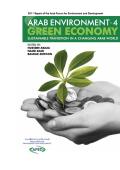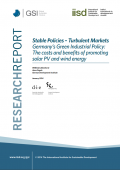Green growth is an environmental policy strategy that aims at an absolute decoupling between economic growth and resource consumption. As far as the applied policy measures focus on direct enhancements of economy-wide resource efficiency levels, their overall achievements might however be weakened by their induced rebound effects. This paper seeks to investigate the nature and significance of such trade-off interrelationships with regards to material efficiency improvements within the German economy. To this, we present the outcomes of individual policy simulations by means of the PANTA RHEI model. Taxes, information, and regulation activities are considered as policy instruments. Our overall empirical findings cannot falsify the green growth paradigm as the observed magnitude of economy-wide rebound effects appears unable to inhibit future absolute decoupling trends.

Green growth strategies play vital roles in unlocking synergies between economic growth, environmental protection, and poverty reduction and enabling a transition to an inclusive green economy. By analyzing around 60 specific government programs from around the world, the GGBP demonstrates that green growth is actively practiced around the world as a dynamic pathway to achieve a green economy and sustainable development. The recommendations for effective green growth approaches, based on the experience of early movers, provides practical guidance for national and sub-national policy planning towards the sustainable development goals in the post-2015 development agenda.
This Synthesis of Key Findings elaborates on nine key actions that enable effective green growth policy:

Sustainable Energy is the sixth in the series of annual reports produced by the Arab Forum for Environment and Development (AFED) on the state of Arab environment. The report highlights the need for more efficient management of the energy sector, in view of enhancing its contribution to sustainable development in the Arab region.
This paper sketches the profile of the changing ‘green growth/economy architecture’ at the global, national, corporate and local levels. It finds that the project of ‘green growth’ continues to gain political momentum, attract new investment and draw in new players. Secondly, it describes some of the frontiers of the green economy discussions. In particular, it shows how issues of equity and social inclusion are no longer fringe moral debates – but those of mainstream economics and politics. Thirdly, it questions if the emerging ‘green growth/economy architecture’ is capable of delivering more equitable outcomes and restoring our environment. Finally, the paper points to some of the key changes in order for the green economy to evolve, mature and supersede the brown economy.
This International Institute for Sustainable Development and the Finance Research Institute of the Development Research Centre, State Council of China, are collaborating on an exploration of policy options to support China in developing a “green financial system,” and to encourage such developments internationally. This paper highlights the findings from the first phase of this partnership.
This guide provides a strategic overview on how to best renew the commitment to forests at a time when deforestation and degradation are still rampant. It also presents potential solutions to address business as usual (BAU) as it relates to a viable and more promising future. The intention of this guide is to:
- Emphasize the economic and human benefits surrounding ecosystem goods and services and biodiversity conservation;
- Explore opportunities for forest transformation that are presently available; and
- Increase awareness and coverage of these issues.
This report, by UNEP and INTERPOL, focuses on illegal logging and its impacts on the lives and livelihoods of often some of the poorest people in the world set aside the environmental damage. It underlines how criminals are combining old fashioned methods such as bribes with high tech methods such as computer hacking of government web sites to obtain transportation and other permits. The report spotlights the increasingly sophisticated tactics being deployed to launder illegal logs through a web of palm oil plantations, road networks and saw mills.
The montane forests of Kenya, better known as Kenya’s “Water Towers”, produce direct economic value for its citizens. This value accrues not only from the production of various timber- and non-timber forest products, but also from a range of regulating ecosystem services that provide an insurance value to several key economic sectors. There is also a secondary or indirect multiplier effect associated with the direct economic value of the Water Towers.
This report estimates these economic values, by means of best international analytical practices and environmental and economic evidence from Kenya, and shows that montane forests have consistently been undervalued in conventional national accounting. The findings underline the need for better management, increased investment in montane forests and innovative policy instruments (such as Reducing Emissions from Deforestation and forest Degradation (REDD+)).

Green industrial policy (GIP) is the pursuit by governments of national economic excellence in key green economy sectors, with a view to creating globally competitive domestic firms. It differs in only a few respects from traditional industrial policy, most significantly with respect to the potential global environmental benefit that comes from private sector innovation and competition in these sectors.
GIP is increasingly used by governments in the developed and developing countries, a trend that is likely to be reinforced in coming years by the desire to capture the environmental and economic benefits of green economy sectors. However, as with traditional industrial policy, it is easy to implement policies that undermine rather than support the intended goals.
